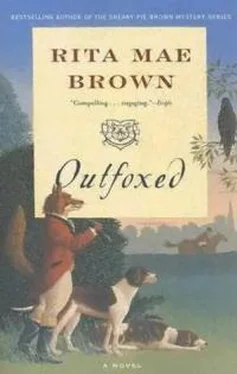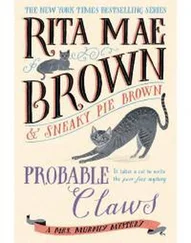Sister watched from the mudroom. She was grateful that Walter had stopped by to offer sympathy over Peter’s death and to tell her he’d seen the fox’s body. He carefully did not mention standing in on Peter’s autopsy.
While biologically on schedule, Peter’s death certainly was untimely in other respects. She relied on his wisdom, his sense of people.
Raleigh stuck his nose in her hand. “Don’t worry.”
Rooster, brought home from Peter’s, was so sad it made her heartsick to see him. Even Golly was nice to him. She’d brought the chickens home, too.
She patted Rooster’s head, then flicked her black-and-blue wool scarf off the peg, slipped into a worn but warm olive quilted vest, pulling on a barn coat with a flannel lining over that. She and Raleigh walked out the back door.
The mercury had plummeted into the low twenties. She walked past the stable, the dutch doors shut against the cold. She heard Lafayette snoring, which made her laugh. She’d never met a horse who could make as much noise sleeping as her trusty gray partner.
Two hundred yards away she passed Doug’s cottage, the pale straw-colored leaves on the Indian corn attached to the front door rustling in the light wind. She heard laughter within. Cody’s car was parked on the other side of Doug’s truck. The farm road ran between Doug’s cottage and Shaker’s bigger old-fashioned Virginia farmhouse on the right, a hundred yards farther down. A single light shone from the upstairs bedroom, the lace curtains pulled on each side. He was reading Patrick O’Brian sea stories, no doubt. Shaker, like millions of others, loved those tales. And like millions of other men he felt he’d been born in the wrong time. Luckily for Shaker, his work was physical and occasionally dangerous. Most poor sods chained in front of computer screens could only dream of adventure or they lived for the weekends where they did what men are supposed to do: run, jump, climb, battle the elements and sometimes each other.
She walked under the allée of hickories. The front drive was lined in maples. Much as she adored the intense fall color, she liked this back farm road with the hickories. It had a safe feel and in the summer the leaves formed a canopy over the dirt road. The hickories shorn of their leaves guarded the lane like dark, symmetrical sentinels.
The lane forked. To the left it ran up to the base of Hangman’s Ridge, snaking finally up to the great oak itself. To the right it curved into the hound graveyard.
Sister pushed open the wrought-iron gate, smooth on its hinges. In the middle of the square under the walnut tree reposed a larger-than-life stone statue of a hound running. On the front it read: REST, DEAR FRIENDS. WE WILL HUNT AGAIN SOMEDAY.
On each side of the base, a bronze plaque was bolted and each hound’s name was engraved, birth date and death date.
The plaques, representing forty years of Jefferson Hunt hounds, were filled. Newer plaques were affixed to the wrought-iron fence. The last one, bearing three names, had Archie’s name freshly carved.
A stone bench under a crabapple tree nestled in one corner. Sister sat down, Raleigh at her feet.
A fat snowflake twirled earthward, soon followed by another and another. The dark sky now had a pinkish cast.
Raleigh leaned shoulder to shoulder with Sister on the bench.
“Orion and Thurman, Bachelor and Button, Laura and Grinch.” She sighed. “I was young then and oh that seems so long ago, Raleigh, and yet like yesterday.” She read aloud other names. “Yoyo, Chigger, Splash, and Schooner. What good hounds. How lucky I’ve been in this life to have known such hounds. To be able to stay healthy, to have good friends. I think foxhunters are as nutty as golfers. You can’t think about much else, really.” The snow dropped thicker and faster. “You know, Raymond wanted to be buried here but his mother wouldn’t hear of it. She dragged him to Hollywood in Richmond. He’s with his kin and two presidents, John Tyler and I can never remember the other one. He’d rather have been with the hounds. Ray Junior is on the hill. Someday I’ll be with him. I think about moving Big Raymond. Once his mother died I guess I could have but then—” She put her arm around the glossy black shoulders. “It seems I should leave well enough alone. I guess they’ll plant Peter with his people. They’re all up by Monticello. It’s funny how families come back together in death. So often they couldn’t do it in life but once dead, people who hated one another are laid side by side. If that great day comes and the tombs give up their dead, can you imagine the shock? You pop out of your grave and there’s your brother, Fred, who you would happily dispatch all over again. Ha.”
“Something’s outside the cemetery.”
She hugged him closer. “Archie was the best. Brave and true. Diana, Cora, and Dragon didn’t back down but poor Archie paid for his courage. If you’d been there, you’d have jumped right in. Raleigh, you’re young and may you live a long time. You’ll be with me at the end. I promise. Golly, too, spoiled-rotten cat.” She smiled, determined not to cry. “I look at this ground and four decades of my life are here. It doesn’t seem possible. Losing Archie doesn’t seem possible. And Peter Wheeler. If you could have seen Peter in his forties and fifties. What a man. God, what a bizarre time.” She shivered, not from the cold. Sniffled. Collected herself and said with quiet determination, “I’m going to lay a trap for our killer. I can’t tell a soul and I refuse to kill a fox. I’d like to get the killer for killing the fox as much as for killing Fontaine. Damn him.” She paused. “Thanksgiving hunt. If only the foxes will cooperate.”
As she said that Inky came out of hiding. “Don’t chase me,” she said to Raleigh. “I’ll help.”
“I’ll tell the hounds.”
Sister, startled, blinked. “You.”
Inky blinked, then scampered away, leaving perfect fox prints in the gathering snow.
CHAPTER 52
A long polished table left just enough space to squeeze in and out of one’s chair. Vin Barber wanted a conference room like the conference rooms the ritzy Charlottesville and Richmond lawyers had. But Vin couldn’t get along with a plethora of partners and so kept his practice to himself and his son—more to himself, since his son was an unimpressive specimen.
Vin was, nonetheless, a good lawyer whose specialty was real estate and conservation, the two being allied.
Sitting at the head of the table, his bald head bent over the long legal briefs encased in heavy light-blue paper, spectacles down his nose, Vin could have walked out of a Daumier lithograph, minus the wig and robes, which would have improved his appearance.
Sister sat on his right and Bobby Franklin sat on his left. As president of Jefferson Hunt, Bobby needed to attend the meeting.
Having just heard the last will and testament of Peter H. Wheeler, they were stunned.
“Remarkable!” she exclaimed.
Bobby folded his hands together. “Yes, but can we meet his conditions?”
“I’d damn well try if I were you,” Vin, characteristically direct, said.
Bobby leaned across the table toward Sister. “Live to one hundred.”
“God willing.”
“No joint-masters.” Vin put his hands behind his head. “You don’t really want one anyway, do you? Even if Crawford wrote big checks, can you imagine talking to him on the phone every twenty minutes? He’s high-maintenance. Like to run you wild.”
“We can manage without a joint-master but operating expenses don’t diminish, as you know. Inflation affects us as well as General Motors.” Sister grasped the economics of the club, which is more than some masters. “We’ll find a way. But let me be clear: All of Peter Wheeler’s estate is held for Jefferson Hunt so long as I live and so long as I don’t take a joint-master. And he has left an annual income of fifty thousand dollars a year from his portfolio to maintain the farm.”
Читать дальше












